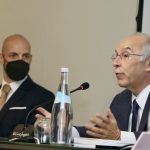Tourism and the day after Covid-19 – what needs to be done?
The tourism and tourism-related property development sectors in Portugal have been hard hit by the Covid-19 crisis, but there is room for cautious optimism providing the government opens up the tourism sector now and provides a package of fiscal stimuli to help struggling companies, developers and guest house owners in the sector survive.
Former Secretary of State for Tourism, Adolfo Mesquita Nunes, the President of the Portuguese Association of Real Estate Investors and Developers, Hugo Santos Ferreira, the President of the National Golf Industry (CNIG) Luís Correia da Silva, and the Co-founder of the Local Accommodation Association of Portugal, Carla Costa Reis discuss what needs to be done.
Portugal’s tourism industry has been hit by a triple blow as a result of Covid-19. First, as an economic activity it has, like all sectors in Portugal suffered in terms of wealth creation and employment.
But it is arguably suffering more than other economic activities because it is the last activity to open up after confinement in terms of hotels and local accommodation which were effectively closed for three months.
But it has also suffered in terms of tourist demand since borders have largely remained closed and will do until June while air transport has strident rules in place which reduce flights and passengers numbers, not to mention the restrictions in place in Portugal’s main tourist source markets overseas, particularly in Europe, and generalised fears over travelling and holidaying abroad.
Not only that, there will be a structural change in how humanity will view tourism with many people not wanting to travel or be in cities as fear takes over much as it had done after 11 September attacks in New York.
Promoting a low-risk destination
It is natural that the hotel sector would pursue a policy of more hygiene and sanitisation but the question is does Portugal have the conditions to preserve its tourism sector during the confinement and aftermath period?
Former Secretary of State for Tourism Adolfo Mesquita Nunes thinks so. “This sector will suffer more than the others and for longer which demands a specific recovery programme for the sector”.
Nunes says of the Government and all players involved at national and local levels can’t preserve sector, the effects on Portugal’s economy in terms of jobs and revenues will be dire and extend far beyond just the tourist sector itself.
“It will impact people’s lives because of its huge importance to the economy,” he says, adding that the authorities need to project the perception that Portugal had successfully tackled the crisis and can offer holidays that are relatively safe and risk-free form a public health point of view.
Luís Correia da Silva, President of the Portugal’s National Golf Federation (CNIG) says the impact of the pandemic has been “brutal” for the Tourism industry, for the companies and hotels in the sector that rely on it and the economy as a whole.
“We’ve faced nothing like this in past memory and although we have gone through various crises, I can’t remember anything remotely like this,” he says.
“We have the perception that this crisis is having a huge impact on family incomes and this could determine significant changes in the spending habits of tourists and how they will travel in the future,” he adds.
The importance of tourism
On the positive side, and for the first time in Portugal, both politicians and the general public have a more precise idea of the size and importance of the tourism and travel sectors for Portugal and the relevance that it has in terms of its direct and indirect economic importance for all the economic activities that work in the networks linked to it.
“I think this surprised a lot of people. From one moment to the next people understood that a vast amount of people would pay a heavy price in an area that has been trumpeted for its success, but not always taken seriously by some economists,” says the Golf Federation chief.
Portugal, Correia da Silva says, has a perception of being extremely dependent on tourism and the hospitality sector, and yet all the business people, the municipal councils, and all those involved in the sector have successfully met an international demand, promoting different regional destinations and various types of tourist products.
He says that in the coming months it is evident that the first tourists will be Portuguese and those foreigners already living in Portugal.
“These are very important for the residential leisure market. These second-home non-habitual residents are vital in building the perception that Portugal is a safe country for their fellow citizens overseas to come on holiday to visit” he says.
Three-phase recovery
In terms of tourism market recovery, Portugal will go through three or four phases: 1) Portuguese tourists and overseas residents living in Portugal holidaying in June, July and part of August; 2) As airlines begin to resume limited services there will be some reduced capacity for overseas tourists coming to Portugal from August and September; 3) Regarding long-distance markets such as the US, Brazil and Africa, these tourists will probably only return from November and December and into 2021.
What worries Luís Correia da Silva most, however, is the situation in the United Kingdom which is Portugal’s most important overseas market for tourists, particular for the Algarve, Madeira, Lisbon and Porto and the North.
“If the situation does not improve soon in the United Kingdom we will face more difficulties than we have had before,” he said, adding that the situation involving the Spanish market was also deeply worrying.
The tourism sector in Portugal has a particular weakness, in that it consists of relatively few large economic groups, most in a strong financial position, but many more smaller ones that have considerable exposure in terms of financing and credit, both regarding tourism projects that are operating, and others that are preparing to come on line in the future.
A grand swathe of the tourism is made up of micro and small and medium size companies (SMEs) and it is these players that are facing the greatest difficulties when it comes to making sure that the restart takes place in conditions capable of attracting tourists while providing quality services.
“The coming months will be very complicated, with very low hotel uptake rates across all offer classes, from hotels and local accommodation to golf resorts and convention centres. All areas linked to tourism will suffer reduced demand” says Correia da Silva.
“These companies can hold on for two or three months with some capacity with financial support from the Government, but if the situation continues longer than this, a whole host of these companies will not be able to survive, or will make many of their staff redundant” he warns.
“It is very important that this Government introduces measures to help these companies over this two to three month period,” he adds.
Local Accommodation
Carla Costa Reis, Co-founder of the Local Accommodation Association of Portugal, is in no doubt that many of those running guest houses aimed at tourists are having to turn to the residential rental market as tourists dry up.
“We are going through a very challenging situation and from 15 March local accommodation landlords began receiving cancellations for bookings that had looked to represent a significant contribution for the tourism sector in 2020” she says.
In March turnover fell 40%, while in April cancellations in many areas reached 90% and in May to 0 bookings virtually across the board.
“This is a sector is particularly seasonal, and even in Lisbon and Porto we have four good months and eight off-season months, and have to make our money in the summer months to offset the long winter months,” she stresses.
“Considering that we are a sector made up of small micro-companies, it is normal that the first impact would be on our cashflow situation, and no one was prepared for the impact of this Covid situation, particularly when you take into consideration the investments in renovation and adaptation works undertaken by the landlords,” she adds.
Carla Costa Reis says that most of these landlords have no savings to get them through the crisis and the winter months that follow, and with water, electricity and tax obligations to pay, even the measures proposed by the Government, which are loans, would not be enough to make up for the loss of tourists and revenue caused by the crisis.
“The truth is we don’t have ready cash and that’s a problem, while many apartment owners in local accommodation were excluded in the State Budget for 2019 for social security which means now they can’t even claim that. They have been excluded from any kind of financial help set aside for the companies sector,” she complains.
This has led to local accommodation landlords having to rely on loans, and even then, with the season effectively cancelled, and the prospect of winter ahead “who is going to have the confidence to borrow more money from the banks to keep going until the spring of 2022?”
However, she does praise the excellent promotional work done by the Portuguese tourism board, Turismo de Portugal, with its campaign ‘Can’t skip hope’ as well as Department of Health’s (DGS) sanitary measures prepared for local accommodation which represents “an increase in confidence for both national and international tourists, which means we will be seen as having the sanitary conditions in place to safely welcome them”.
Convert to rent
One solution is to convert these guest houses into accommodation for rent to individuals and families in order to meet the chronic lack of affordable housing in the centre of Lisbon and Porto and other large cities that normally attract tourists.
But there is a problem for many. “Our members can’t simply convert from local accommodation to residential rental because they don’t have the money to pay for the fiscal obligations required to do so. Basically, they have a ball and chain around their legs, especially because of the oscillations in taxes our members will have to pay moving from one segment to the other” she says, pointing out that the owner runs the risk of paying in IRS tax almost the entire amount they had earned in tourism receipts throughout their activity as a guest house.
“Obviously, our members are terrified while all this remains uncertain and face considerable tax risks by converting their properties from local accommodation to residential rental use” she adds.
In fact, in the State Budget for 2020 there was an effort to correct this injustice, providing the property will be put out to residential rent for five years on being taken out of local accommodation. “There is no confidence on the part of landlords or tenants to take out a five-year contract,” she stresses.
Real estate needs to be respected
Hugo Santos Ferreira, Vice-President of the Portuguese Association of Real Estate Developers and Investors (APPII) points out that real estate investors and developers represent 15% of national GDP and captures €30Bn in investment for Portugal per year, similar to the amount generated by tourism. He laments that the real estate sector in Portugal has been treated as the poorer cousin to tourism by the Government because it “isn’t so sexy”.
The sector, in his opinion, had been vital for the Portuguese economy in attracting overseas investment to Portugal, including development projects aimed at tourism, while the investors themselves operating and living in Portugal, including Non-Habitual Residents and Golden Visa holders have represented an annual investment attraction of around €5Bn. To give an idea, since the end of the last financial crisis in 2013-2014, €25Bn has come into Portugal via these investors.
The APPII also represents hotel developers and owners and indirectly the interests of local accommodation which is also linked to the real estate sector.
“We are navigating unchartered waters, the times are uncertain now, but in the short term we have companies that are capitalised, highly professional, and which are trying to survive from their cash reserves and cashflows, but have naturally suffered from falls in revenues, yet even so they have managed to retain their activities active despite this falloff in revenues,” he points out.
In terms of property sales and rents, there has been some decline for patrimonial entities, but on the activity side, the construction sector has seen its projects that were underway, continue. There has been a decline in new projects, but the majority of overseas investments say they will continue to invest, and these overseas investments represent 50% of Portugal’s real estate investment and developer players, including the largest international funds.
Says Hugo Santos Ferreira, “We are pleased to report that we are seeing an appetite and intention from these overseas investors to continue to invest in Portugal. The majority of these international funds, despite this uncertainty, see the prospects for recovery within six to 12 months.”
And in a time of crisis, the real estate sector has found an opportunity to turn digital and put sales online, with many high-end investors, viewing and buying property and even completing sales all online.
“The activities of these companies serving the upper middle class market has managed to continue because the real estate sector today is much better prepared than it was in the last crisis. We don’t see the kind of slump that we had seen in the Great Recession because these players are less in debt and using fewer loans,” says Santos Ferreira.
The APPII vice-president points out that the majority of real estate investment in Portugal following the crisis was not as a result of internal demand since companies were not well capitalised. We had to mostly look to overseas investment which is less affected by national slumps,” he adds.
Long term outlook
Hugo Santos Ferreira believes that the outlook for the real estate development market in terms of tourism and other property sectors is “cautiously optimistic”.
“Speaking to construction companies and developers, they say the commitment on the part of international financiers and funds has not gone away”.
The APPII vice president insists that Portugal’s real estate sector can once again help kick-start the Portuguese economy after Covid-19 because it still has the existing real estate investment from funds. He emphasises that it is important for the Government not to forget these companies like it did during the Great Recession.
“Our companies will be able to withstand two of three months with the cash that they have, but will not cope with many more months than that without cashflow coming in,” he warns stating that the sector must not be overlooked by the Government in terms of emergency help and a raft of measures.
Hugo Santos Ferreira explains that Portugal’s real estate development sector has so far had no help whatsoever from the Government’s emergency funds, let alone any of the tax breaks the APPII has campaigned for, for so long.
These include tax incentives such as reducing VAT to 6% to encourage development, particularly for much needed new-build homes for the Portuguese middle classes, tax incentives without which, considering the sector’s importance to the national economy, don’t make sense.
“If we want to continue to capture and maintain overseas real estate investment, developers need to be able to startup again immediately, investors need to be told they are very welcome in Portugal, Golden Visa applicants should be welcomed in this country, and we have to make the real estate market attractive again for both investors and developers,” he said.
Tax and red tape
Part of the problem is that the rising cost of building materials, the high cost and lack of manpower and Portugal’s continued resistance to reducing red tape and high taxes makes it almost impossible for a developer to build new affordable residential homes and make a profit.
The APPII, to this end, has set up a programme called “Relaunch the Economy” with a number of measures that the sector needs. These have been divided in temporary measures until the end of the year, and more medium to long-term measures.
These include a suspension or reduction in the property taxes IMI (Property Tax) and IMT (Municipal Tax on Property Sales) to help provide liquidity for the companies to get back to work and continue.
Also, an extension of the moratoria in fiscal terms as well as suspending administrative deadlines on licensing and planning permission applications, including the three-year property resale fiscal deadline.
Third, speeding up and streamlining municipal urban planning permission processes whose current red tape is the one singe aspect that most puts off overseas investors.
Four, make long-distance property deals legally viable because of the current exceptional circumstances, eventually paving the way for online planning permission and contract processes.
Other measures the APPII vice president suggests is an exemption or extension period to pay IRC tax due by July 2020 (regarding 2019 fiscal year) and a suspension of capital and interest payments on real estate investments for a period of six months.
In conclusion, Portugal’s industry has suffered across the board and the Government expects a recession that will wipe of over 7% of her GDP in 2020.
But Portugal’s tourism and real estate development sectors are a vital driver for the economy both in terms of getting Portugal’s economy going again and assuring its long-term future. It is time, say the players, to start treating the two with the respect their importance deserves.










